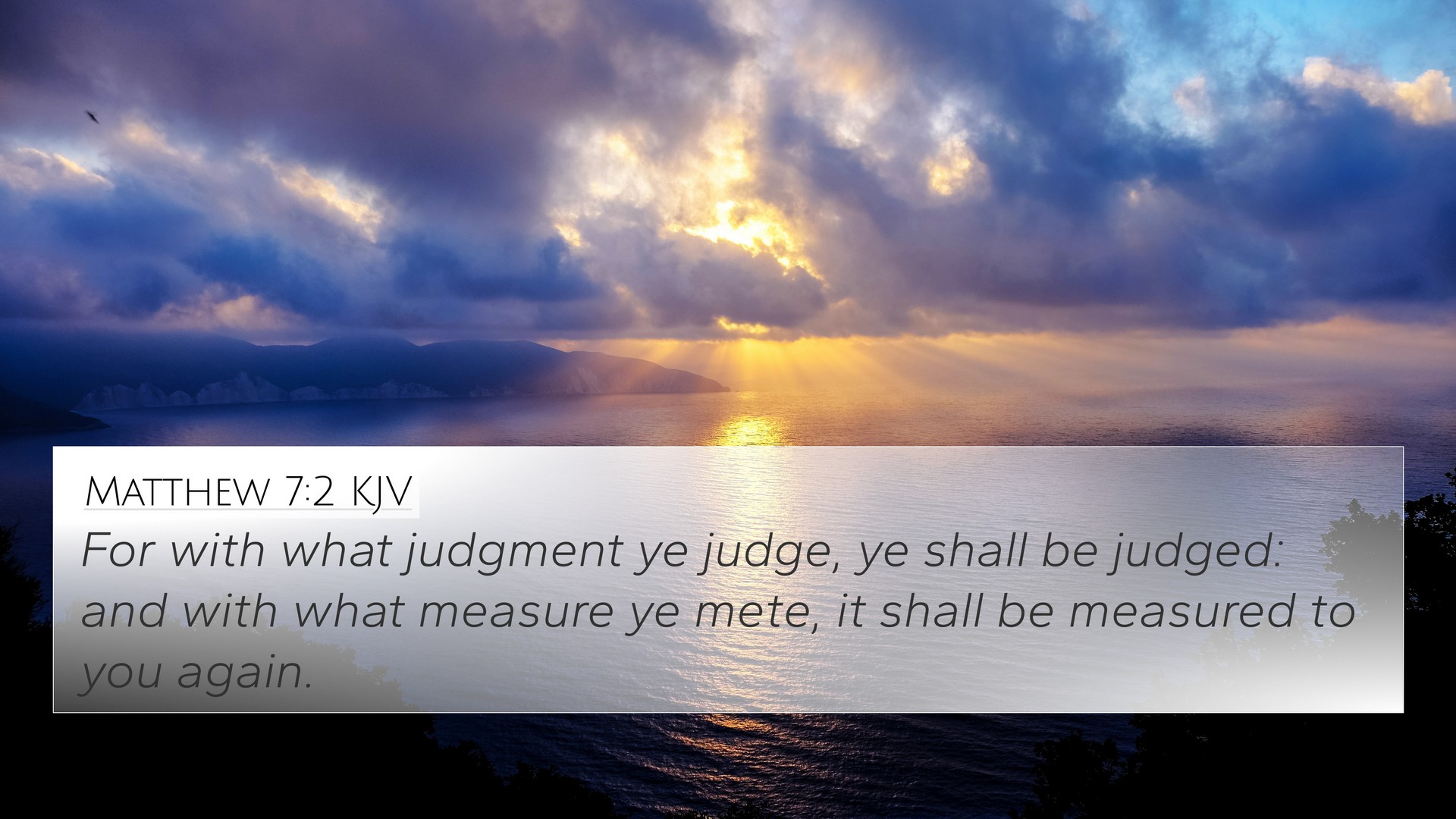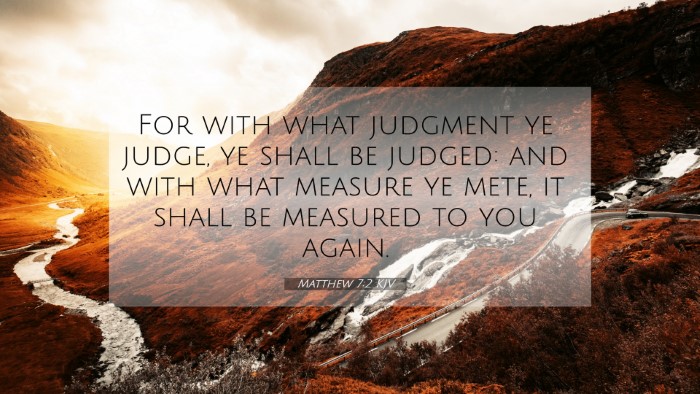Understanding Matthew 7:2
Verse Text: "For with what judgment you judge, you will be judged; and with the measure you use, it will be measured back to you."
This verse from the Gospel of Matthew encapsulates fundamental principles about judgment and discernment. It emphasizes the reciprocal nature of how we treat others in relation to how we will be treated by God and by others.
Commentary Insights
Matthew Henry's Commentary highlights that this verse is a warning against hypocritical judgment. It reminds believers that the standard they apply to others will be the same standard applied to them. Henry explains that this reciprocal principle serves both as a caution and as a guidance for self-examination before criticizing others.
Albert Barnes's Notes elaborate further by asserting that human judgment is limited and often flawed. He encourages readers to consider the mercy and grace of God alongside the judgment, reinforcing the notion that those who are merciful will experience mercy in return.
Adam Clarke's Commentary states the importance of context in understanding judgment. He emphasizes that the measure in question is not merely disciplinary but also speaks to the intentions and heart of the individual. Clarke urges believers to reflect on their own imperfections before pointing out the shortcomings of others.
Key Themes of Matthew 7:2
- Self-Reflection: Encourages believers to look inwardly before passing judgment.
- Mercy: Highlights the necessity of mercy in judgment and the blessings of being merciful.
- Reciprocity: Addresses the principle that our actions towards others influence how we will be treated.
Bible Verse Cross-References
Matthew 7:2 is interwoven with various other Biblical texts. Here are some significant cross-references that relate to this passage:
- Luke 6:38: "Give, and it will be given to you; good measure, pressed down, shaken together, and running over, will be put into your bosom. For with the same measure that you use, it will be measured back to you."
- James 2:13: "For judgment is without mercy to the one who has shown no mercy. Mercy triumphs over judgment."
- Romans 2:1: "Therefore you are inexcusable, O man, whoever you are who judge. For in whatever you judge another you condemn yourself; for you who judge practice the same things."
- Galatians 6:7: "Do not be deceived, God is not mocked; for whatever a man sows, that he will also reap."
- Proverbs 11:17: "The merciful man does good for his own soul, but he who is cruel troubles his own flesh."
- Matthew 6:14-15: "For if you forgive men their trespasses, your heavenly Father will also forgive you. But if you do not forgive men their trespasses, neither will your Father forgive your trespasses."
- Mark 4:24: "Then He said to them, 'Take heed what you hear. With the same measure you use, it will be measured to you; and to you who hear, more will be given.'
Comparative Bible Verse Analysis
When we analyze Matthew 7:2 alongside its cross-references, several themes emerge:
- Judgment and Accountability: Each verse reinforces the concept that we are accountable for our actions and the way we treat others.
- Mercy and Compassion: The consistent message across these scriptures advocates for mercy as a vital virtue within the Christian life.
- Reciprocal Actions: The biblical principle that our actions will return to us shapes the moral landscape of Christian teaching.
How to Use Bible Cross-References
Understanding Matthew 7:2 alongside these connections encourages deeper study and reflection. Here are some tools and methods for effective Bible cross-referencing:
- Use a Bible concordance to find related verses that share similar themes.
- Consult a Bible cross-reference guide for comprehensive listings of related scriptures.
- Engage in cross-referencing Bible study methods to explore the links between various texts.
- Utilize reference resources such as study Bibles or online databases for thematic connections.
- Incorporate Bible chain references to track a theme or topic throughout the scriptures.
Identifying Connections Between Old and New Testament
In a broader scope, exploring the connections between Old and New Testament teachings can enrich understanding. For example, the themes of mercy and judgment prevalent in the Old Testament illuminate the teachings found in the New Testament, including those in Matthew 7:2.
Conclusion
Matthew 7:2 serves as a crucial reminder of the values of mercy, self-examination, and reciprocal respect within the Christian faith. By studying cross-references, believers can deepen their understanding and application of these principles, fostering a more compassionate approach to relationships, both with God and others.













